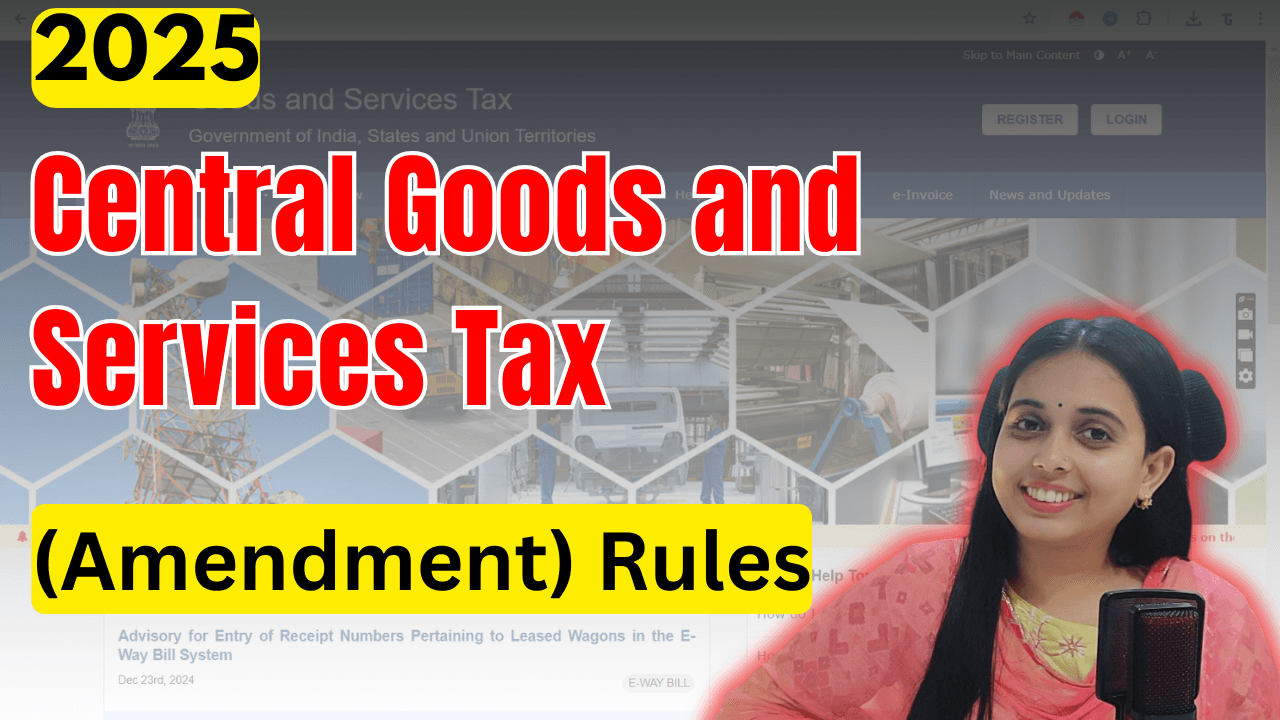Central Goods and Services Tax (Amendment) Rules, 2025
Central Goods and Services Tax (Amendment) Rules On January 23, 2025, the Ministry of Finance issued Notification No. 07/2025 – Central Tax, which introduces amendments to the Central Goods and Services Tax (CGST) Rules, 2017. These amendments aim to simplify compliance procedures and address specific requirements under the CGST Act, 2017. Below is a comprehensive breakdown of the changes and their implications.
Introduction of Rule 16A: Grant of Temporary Identification Number (TIN)
A major highlight of the amendments is the insertion of Rule 16A, which provides for the issuance of a Temporary Identification Number (TIN). This new provision is designed for individuals who are:
- Not liable for registration under the CGST Act but
- Required to make payments under the Act (e.g., for transactions triggering GST liability).
The rule empowers the proper officer to grant a TIN and issue an order in Part B of FORM GST REG-12.
Key Features of Rule 16A:
- Applicable to individuals or entities not registered under GST but obligated to pay GST in certain circumstances.
- Central Goods and Services Tax (Amendment) Rules Ensures proper documentation and tracking of payments made by unregistered individuals.
- Aligns with the objective of increasing transparency and accountability in GST compliance.
Amendments to Rule 19: Updates to Sub-rule (1)
In Rule 19(1), the following addition has been made:
After the words, letters, and figures “FORM GST REG-10,” the words, letters, and figures “or in the intimation furnished by the composition taxpayer in FORM GST CMP-02” shall be inserted.
Implication:
- This amendment incorporates provisions for composition taxpayers who file their intimation in FORM GST CMP-02, ensuring procedural consistency for taxpayers opting for the composition scheme.
Amendments to Rule 87: Updates to Sub-rule (4)
In Rule 87(4), the following modification has been made:
After the words “common portal,” the words, figures, and letters “as per rule 16A” shall be inserted.
Implication:
- Ensures that the process for utilizing the common GST portal is aligned with the newly introduced Rule 16A.
- Provides a clear framework for managing temporary registrations or identification numbers on the portal.
- Substitution of FORM GST REG-12
The existing FORM GST REG-12 has been replaced with a new, more detailed version to accommodate the provisions introduced by Rule 16A. Central Goods and Services Tax (Amendment) Rules The new form is designed to address both temporary registrations and identification numbers. Here are the key details:
Part A – Temporary Registration:
- Applicable for individuals or businesses temporarily registered under GST.
- Captures detailed information such as:
- Name, gender, date of birth, and address.
- PAN and contact details (mobile number, email, etc.).
- Reasons for temporary registration.
- Effective date of registration and the registration number.
- Bank account details (optional but can include up to 10 accounts).
Part B – Temporary Identification Number:
- Applicable for individuals not liable for registration but required to pay GST.
- Captures similar information as Part A, along with a Temporary Identification Number (TIN).
Key Highlights of FORM GST REG-12:
- Simplifies the process of issuing temporary registrations or identification numbers.
- Ensures transparency by mandating the collection of detailed personal and business information.
- Requires submission of supporting documents, such as a seizure memo, detention memo, or other relevant documentation.
- Directs individuals to apply for proper registration within 90 days of the issuance of the temporary registration order.
Administrative Provisions
The notification includes administrative directives to ensure the smooth implementation of the amendments. Specifically:
- Copies of orders issued under FORM GST REG-12 will be sent to the corresponding Central or State Jurisdictional Authorities for further action or monitoring.
- Officers issuing temporary registrations or TINs must ensure adherence to the updated rules.
Objectives of the Amendments
These amendments aim to achieve the following:
- Inclusion of Unregistered Taxpayers: Central Goods and Services Tax (Amendment) Rules By allowing temporary registrations and identification numbers, the GST framework becomes more inclusive, accommodating individuals or entities with specific payment obligations.
- Enhanced Transparency: Central Goods and Services Tax (Amendment) Rules Requiring detailed information and documentation ensures better tracking and reduces the scope for errors or fraud.
- Improved Compliance: Simplified processes encourage compliance among individuals and businesses not formally registered under GST.
- Alignment with Digital Systems: Updates to the common portal under Rule 87(4) facilitate seamless integration of new provisions into existing digital infrastructure.
- Effective Date of Implementation
The amendments, including the insertion of Rule 16A and the substitution of FORM GST REG-12, will come into force on a date to be notified by the Central Government. Taxpayers and professionals should stay updated on further notifications to ensure timely compliance.
Conclusion
The Central Goods and Services Tax (Amendment) Rules, 2025, represent a significant step toward making the GST framework more adaptable and transparent. Central Goods and Services Tax (Amendment) Rules The introduction of Rule 16A and updates to related provisions reflect the government’s commitment to simplifying processes while maintaining robust compliance mechanisms. Central Goods and Services Tax (Amendment) Rules Taxpayers and GST practitioners are advised to familiarize themselves with these changes and prepare for their implementation once notified.
Stay tuned for more updates and detailed guides on GST compliance!
For More Information : https://taxgyany.com/

